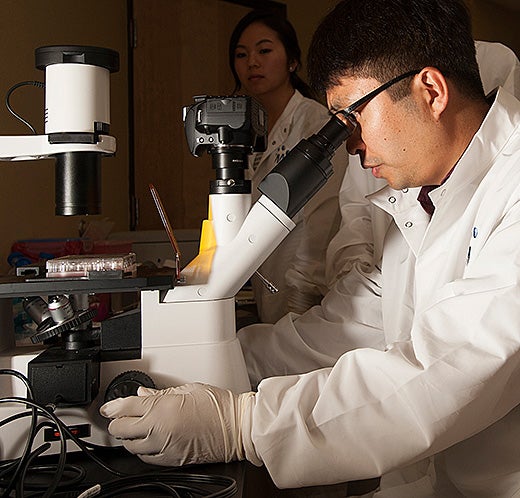When Samantha Wheeler applied for an internship in marketing and sales with a local biotechnology startup, the fourth-year student played up her only relevant experience — working at the Davis Farmers Market.
“I figured if I can sell strawberries, I can sell stem-cell technology,” jokes the community and regional development major from McKinleyville, California.
Wheeler’s positive nature made an impression and in the fall she joined almost 30 interns at Molecular Matrix, a Davis firm that has developed a new technology for growing mammalian cells and tissues.

From Kitchen to Startup
Davis-based biotechnology company Molecular Matrix Inc. started with what founder Charles Lee calls a simple observation he made in his kitchen at home.
What if he could improve on human cell growth in the laboratory by using a sugar-based substance?
Lee, a stem cell biologist who previously held core director positions at research centers at UC Davis, knew that existing 3-D cell culture systems have not yet reached full market potential for a variety of reasons including high prices and insufficient cell attachments and growth.
Most researchers still grow cells in two dimensions, a method developed in 1885, even though it does not accurately represent our complex organ systems.
Five options for internships
The company offers internships to undergraduates in five distinct areas: research, clinical, manufacturing, finance, and sales and marketing. Founder and CEO Charles Lee, a former student and researcher at UC Davis, knows the value of what he can give them when it comes to the translation of science into commercial products. He has made the investment to implement a large-scale internship program correctly.
“I needed help, but I also knew that the internships out there ask students to wash a lot of dishes,” Lee says. “I thought it would be great if we could create something that will actually help them with their careers. What they can get out of it is phenomenal.”
Intern enrichment ‘important’
“Intern enrichment is important,” he adds. “We make sure we give them a chance to get what they need and understand our expectations.”
Lee developed a program that allows students to be hands-on, with a goal of helping them identify and build on unknown strengths. For example, those on the clinical side propose and conduct their own studies with the goal of getting published.
Biological sciences major Scarlett Kim, also a fourth-year student from Cypress, California, who works in the laboratory at Molecular Matrix, planned out the details of her research project. After results are available in February, she plans to write her findings in March, with the hope of publishing in a research journal soon after.
“In college, we’re always reading scientific papers, and now we get to write our own,” Kim says. “I really look forward to doing that.”
Including experience in nursing application
She said such a leadership role should help her when she applies for nursing school later this year. She is now even considering making research a focus in her studies.
“I never thought I would have wanted this as a goal, but working here and seeing how much impact it could make makes me want to keep being involved,” she says.
Field experience, too
And, as in Wheeler’s case, interns can get field experience, with the help of Chief Operating Officer Jim Keefer.
She has taken on her own sales accounts, trying to boost interest in the cell technology so that when it’s ready for market, researchers will want to use it.
“I was nervous to approach a scientist for the first time, because I felt underqualified,” Wheeler says. “But he was receptive and very kind. That was a cool moment for me.”
Evolving the internship program
To further strengthen the program, Lee said he is also considering adding additional elements, such as seminars that would help his interns as they prepare to enter the job market. He also provides interns, who receive class credit and transcript notations for their time, with a workspace for studying.
The UC Davis Internship and Career Center has already taken notice of his efforts.
“We have been pleased to engage with this new local company as they build a robust internship program,” says Janice Morand, health and biological sciences coordinator with the Internship and Career Center.
She points out that students benefit from the opportunity to apply their coursework, develop professional skills and explore career options through internships.
Exploring new subject areas
For Wheeler, no stranger to internships and who concurrently works at a pediatric center, the experience at Molecular Matrix has allowed her to explore a new subject area, test a different skillset and consider a wider range of career possibilities.
“We’re all given a lot of responsibility, which makes this internship very unique,” says Wheeler. “That’s been really refreshing, because here, you feel like an important part of the business.”
To apply for an internship at Molecular Matrix, contact the company directly or the UC Davis Internship and Career Center.
